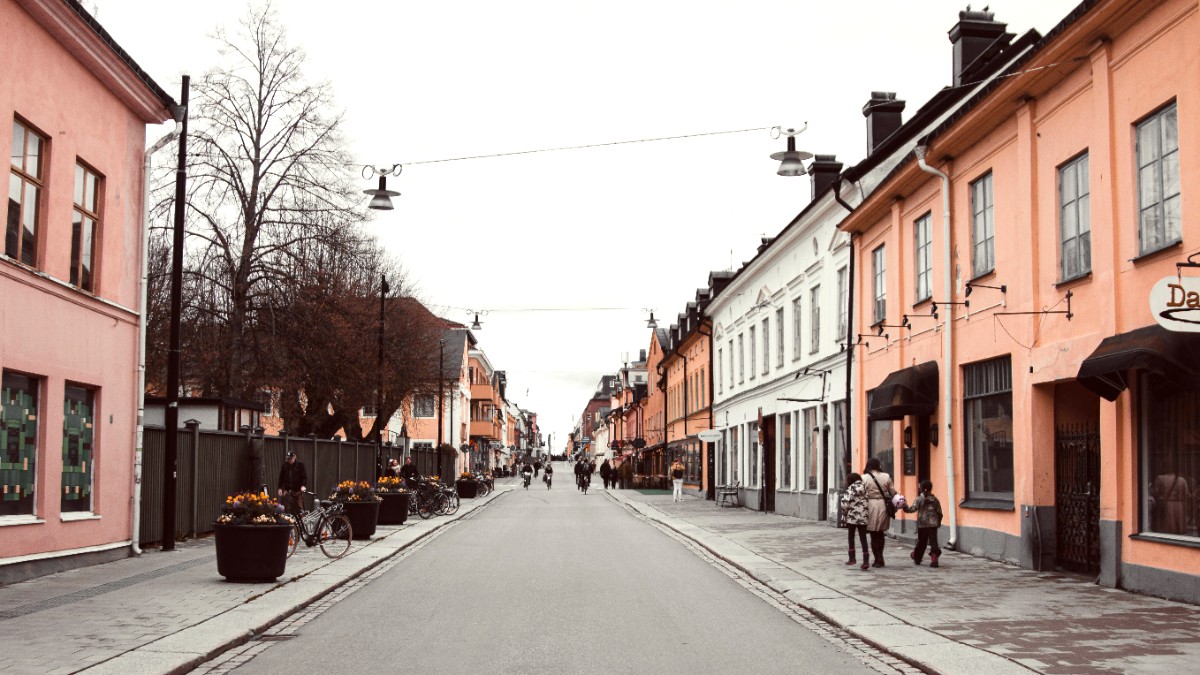
Svealand, Sweden
Summer (June-August) brings the warmest weather, with average daily temperatures ranging from 15°C to 22°C (59°F to 72°F). July usually feels the warmest. Precipitation remains moderate, often appearing as scattered showers that typically clear quickly. Humidity is generally low to moderate. A prominent feature of Swedish summers is the extremely long daylight hours, with the sun setting very late, especially in June and early July. One can enjoy extended evenings for outdoor dining and exploration. Autumn (September-November) sees temperatures gradually cool. September sees temperatures around 10-15°C (50-59°F), dropping closer to freezing by November. Precipitation increases, often bringing rainy days. Daylight hours shorten noticeably, preparing the city for winter's embrace. The landscape transforms with beautiful autumn foliage, especially in September and early October.
Winter (December-February) marks Uppsala's coldest period. Average daily temperatures hover around -5°C to 0°C (23°F to 32°F). Snowfall is common, and the ground frequently stays covered in a blanket of snow, creating a picturesque, often quiet, atmosphere. Daylight hours are very short during winter, notably in December, when the sun may rise late and set early. This period holds unique winter experiences. Spring (March-May) temperatures slowly begin their ascent from freezing in March to a pleasant 10-15°C (50-59°F) by May. Precipitation lessens compared to autumn, and daylight hours steadily increase. Spring brings the city back to life, with blooming flowers and trees, signaling the approach of warmer months.
Uppsala does not experience extreme weather phenomena like monsoons or hurricanes. While winter can bring periods below -10°C (14°F) and summer might see occasional heatwaves exceeding 25°C (77°F), these extremes are rare.
Prepare for sudden weather changes, especially outside of summer. Always pack layers to adapt to varying conditions throughout the day.
June-August
Warmest weather, longest daylight. All attractions maintain full operating hours. Outdoor activities are pleasant.
Higher prices for accommodation and flights. Popular tourist spots can become crowded. Booking well in advance is advisable.
April-May & Sep-Oct
Milder weather, fewer crowds. Prices for accommodation and flights are typically lower. Spring brings beautiful blooms, while autumn holds stunning foliage.
Weather can feel variable, with cooler temperatures or more rain. Some outdoor attractions might have reduced hours as seasons change.
November-March
Lowest prices for flights and accommodation. Unique winter experiences. The city maintains a cozy atmosphere, and one encounters fewer tourists.
Cold temperatures and short daylight hours. Some attractions may close or operate with limited hours. Snow and ice can affect travel conditions, calling for appropriate footwear.
For cycling, walking, and park visits, June to August offer the best weather. Cultural sightseeing and museums are enjoyable year-round; consider shoulder seasons for fewer crowds.
Immerse yourself in student life during academic semesters (September-December, January-May). Visit Christmas markets from late November to mid-December. Experience Midsummer in late June, Waffle Day on March 25th, or Walpurgis Eve on April 30th.
Uppsala weather changes quickly, especially outside summer. Pack layers.
Periods below -10°C or above 25°C are rare but can occur.
The city does not experience monsoons or hurricanes.
In winter, be ready for icy conditions and short days.
Use sun protection during long summer daylight hours.
Sweden is part of the Schengen Area, impacting requirements for many international travelers.
Non-EU/EEA nationals without visa-free agreements must obtain this visa. It permits stays up to 90 days within any 180-day period. Apply through the Swedish embassy or consulate in your home country, well in advance.
Always carry your physical passport, valid for at least three months beyond your departure from the Schengen Area, with two blank pages. Also, have physical copies of your travel insurance and any required visa.
Sweden is known for being a relatively expensive country, but smart budgeting creates a rewarding experience in Uppsala.
Sweden is a safe country, but knowing basic health precautions and emergency procedures is wise.
Routine vaccinations like MMR, DTaP, Varicella, Polio, and seasonal influenza.
Ticks are frequent in wooded/grassy areas. Wear long clothing, use repellent, and check for ticks. TBE vaccination advisable if recommended by doctor.
Pollen counts rise in spring/summer. Pack allergy medication. Summer sun can feel strong; use sunscreen.
Emergency Number: 112
Sweden is a high-quality public healthcare system. Emergency care is accessible to all. For non-emergencies, visit a "Vårdcentral." Pharmacies ("Apotek") are widely available.
Tap water in Uppsala is safe to drink. Food hygiene standards are very high. Uppsala is a very safe city with low crime rates. Petty crime, like pickpocketing, can occur in crowded areas, but is not prevalent.
Always have travel insurance covering medical emergencies and repatriation.
Purchase comprehensive travel insurance. Coverage should include medical emergencies, hospitalization, medical evacuation, and repatriation. (World Nomads, SafetyWing)
Ensure your policy covers trip cancellation or interruption, and lost or stolen baggage and personal belongings.
General Emergency: 112 (Police, Ambulance, Fire). Non-Emergency Police: 114 14. Healthcare Advice (non-emergency): 1177.
Sweden faces a very low risk of major natural disasters. Earthquakes are rare and generally minor.